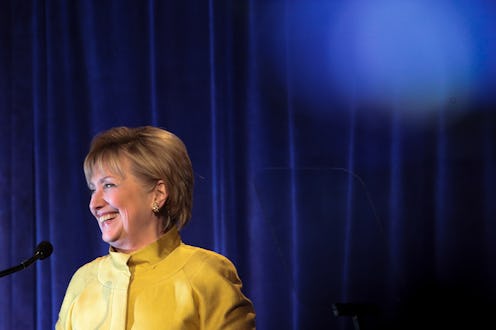News
Hillary Clinton Says Misogyny Is Partly To Blame For Her Loss

Former Democratic presidential candidate, secretary of state, and New York senator Hillary Clinton sat down for her first post-election interview with CNN's Christiane Amanpour on Tuesday, and she gave her take on what transpired in her 2016 presidential election loss. While she cited many contributing factors, including her own responsibility for what happened, she also acknowledged a particularly pernicious societal factor that reared its head once again: sexism. Specifically, Clinton told Amanpour that misogyny played a role in her loss, and that it continues to be a factor "politically, and socially, and economically."
That was far from the only reason she cited, to be clear. She also touched on the eleventh-hour intervention of FBI director James Comey, whose late-October letter informing Congress of the discovery of a new (although ultimately duplicate and unimportant) trove of Clinton emails had a measurable and potentially decisive effect on the polls.
She also mentioned the intervention of the Russian government to hurt her chances ― long asserted by U.S. intelligence agencies, and now the subject of an FBI investigation into possible coordination with the Trump campaign ― and, of course, accepted some blame herself for how it all went wrong. But with so many factors in play, something that's gotten less attention in recent months is the element that anyone conscious of institutional sexism could've seen coming long before Election Day.
Well, you know, the book's coming out in the Fall, but just to give you a tiny little preview, yes, I do think [misogyny] played a role. ... It is real, it is very much a part of the landscape politically, and socially, and economically.
As Clinton alluded to in her answer, she's planning to release a book about her presidential election loss later this year. She described the process of writing the book as "painful," and claimed "absolute personal responsibility" for her loss, even as she cited external contributing factors like Comey, Russia, and misogyny.
Clinton also took the opportunity to claim herself among "the Resistance," a popular rallying cry for some progressives in the aftermath of Trump's victory and the early months of his presidency. In short, if you were a supporter or admirer of Clinton's, you'll probably want to give the full interview a look. After all, it's her first return to the public sphere in a back-and-forth interview setting, and it wasn't solely about the election ― she also discussed women's rights, and implored the Trump administration to prioritize them around the world.